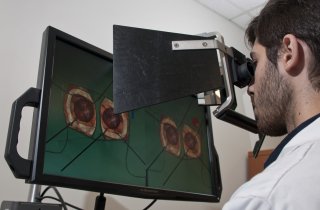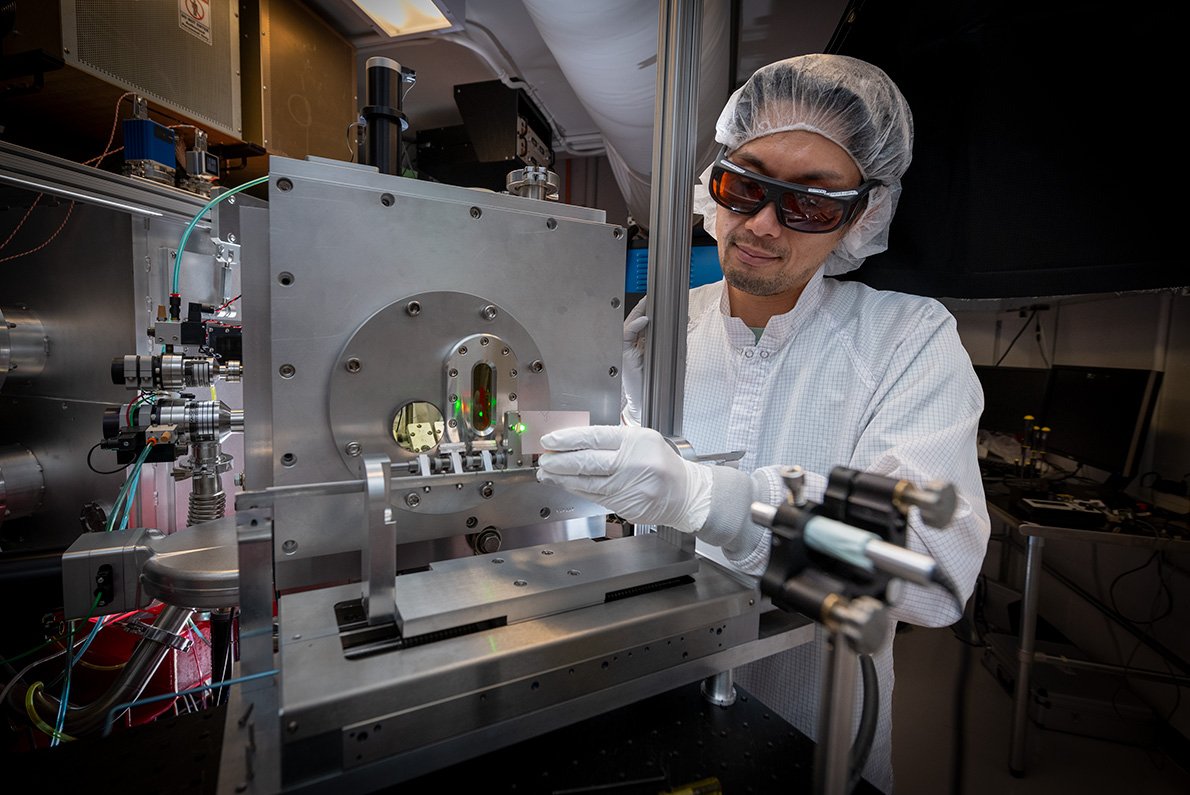AI Research
Human instruction with artificial intelligence guidance provided best results in neurosurgical training | Channels

Study has implications beyond medical education, suggesting other fields could benefit from AI-enhanced training
Artificial intelligence (AI) is becoming a powerful new tool in training and education, including in the field of neurosurgery. Yet a new study suggests that AI tutoring provides better results when paired with human instruction.
Researchers at the Neurosurgical Simulation and Artificial Intelligence Learning Centre at The Neuro (Montreal Neurological Institute-Hospital) of McGill University are studying how AI and virtual reality (VR) can improve the training and performance of brain surgeons. They simulate brain surgeries using VR, monitor students’ performance using AI and provide continuous verbal feedback on how students can improve performance and prevent errors. Previous research has shown that an intelligent tutoring system powered by AI developed at the Centre outperformed expert human teachers, but these instructors were not provided with trainee AI performance data.
In their most recent study, the researchers recruited 87 medical students from four Quebec medical schools and divided them into three groups: one trained with AI-only verbal feedback, one with expert instructor feedback, and one with expert feedback informed by real-time AI performance data. The team recorded the students’ performance, including how well and how quickly their surgical skills improved while undergoing the different types of training.
They found that students receiving AI-augmented, personalized feedback from a human instructor outperformed both other groups in surgical performance and skill transfer. This group also demonstrated significantly better risk management for bleeding and tissue injury—two critical measures of surgical expertise. The study suggests that while intelligent tutoring systems can provide standardized, data-driven assessments, the integration of human expertise enhances engagement and ensures that feedback is contextualized and adaptive.
“Our findings underscore the importance of human input in AI-driven surgical education,” said lead study author Bianca Giglio. “When expert instructors used AI performance data to deliver tailored, real-time feedback, trainees learned faster and transferred their skills more effectively.”
While this study was specific to neurosurgical training, its findings could carry over to other professions where students must acquire highly technical and complex skills in high-pressure environments.
“AI is not replacing educators—it’s empowering them,” added senior author Dr. Rolando Del Maestro, a neurosurgeon and current Director of the Centre. “By merging AI’s analytical power with the critical guidance of experienced instructors, we are moving closer to creating the “Intelligent Operating Room” of the future capable of assessing and training learners while minimizing errors during human surgical procedures.”
The study was published in the journal JAMA Surgery on Aug. 6, 2025. It was funded by the Brain Tumour Foundation of Canada, the Royal College of Physicians and Surgeons of Canada, a Mitacs Accelerate Grant, the Franco Di Giovanni Foundation, Canadian Graduate Scholarships, Le Fonds de recherche du Québec – Santé, and a McGill University Max Binz Fellowship.
About The Neuro
The Neuro – The Montreal Neurological Institute-Hospital – is a bilingual, world-leading destination for brain research and advanced patient care. Since its founding in 1934 by renowned neurosurgeon Dr. Wilder Penfield, it has grown to be the largest specialized neuroscience research and clinical center in Canada, and one of the largest in the world. The seamless integration of research, patient care, and training of the world’s top minds make The Neuro uniquely positioned to have a significant impact on the understanding and treatment of nervous system disorders. It was the first academic institute in the world to fully adopt Open Science, to help accelerate the generation of knowledge and discovery of novel effective treatments for brain disorders. The Neuro is a McGill University research and teaching institute and part of the Neuroscience Mission of the McGill University Health Centre. For more information, please visit www.theneuro.ca
AI Research
How AI and Automation are Speeding Up Science and Discovery – Berkeley Lab News Center

The Department of Energy’s Lawrence Berkeley National Laboratory (Berkeley Lab) is at the forefront of a global shift in how science gets done—one driven by artificial intelligence, automation, and powerful data systems. By integrating these tools, researchers are transforming the speed and scale of discovery across disciplines, from energy to materials science to particle physics.
This integrated approach is not just advancing research at Berkeley Lab—it’s strengthening the nation’s scientific enterprise. By pioneering AI-enabled discovery platforms and sharing them across the research community, Berkeley Lab is helping the U.S. compete in the global race for innovation, delivering the tools and insights needed to solve some of the world’s most pressing challenges.
From accelerating materials discovery to optimizing beamlines and more, here are four ways Berkeley Lab is using AI to make research faster, smarter, and more impactful.
Automating Discovery: AI and Robotics for Materials Innovation
At the heart of materials science is a time-consuming process: formulating, synthesizing, and testing thousands of potential compounds. AI is helping Berkeley Lab speed that up—dramatically.
A-Lab
At Berkeley Lab’s automated materials facility, A-Lab, AI algorithms propose new compounds, and robots prepare and test them. This tight loop between machine intelligence and automation drastically shortens the time it takes to validate materials for use in technologies like batteries and electronics.
Autobot
Exploratory tools like Autobot, a robotic system at the Molecular Foundry, are being used to investigate new materials for applications ranging from energy to quantum computing, making lab work faster and more flexible.
AI Research
Captions rebrands as Mirage, expands beyond creator tools to AI video research

Captions, an AI-powered video creation and editing app for content creators that has secured over $100 million in venture capital to date at a valuation of $500 million, is rebranding to Mirage, the company announced on Thursday.
The new name reflects the company’s broader ambitions to become an AI research lab focused on multimodal foundational models specifically designed for short-form video content for platforms like TikTok, Reels, and Shorts. The company believes this approach will distinguish it from traditional AI models and competitors such as D-ID, Synthesia, and Hour One.
The rebranding will also unify the company’s offerings under one umbrella, bringing together the flagship creator-focused AI video platform, Captions, and the recently launched Mirage Studio, which caters to brands and ad production.
“The way we see it, the real race for AI video hasn’t begun. Our new identity, Mirage, reflects our expanded vision and commitment to redefining the video category, starting with short-form video, through frontier AI research and models,” CEO Gaurav Misra told TechCrunch.
The sales pitch behind Mirage Studio, which launched in June, focuses on enabling brands to create short advertisements without relying on human talent or large budgets. By simply submitting an audio file, the AI generates video content from scratch, with an AI-generated background and custom AI avatars. Users can also upload selfies to create an avatar using their likeness.
What sets the platform apart, according to the company, is its ability to produce AI avatars that have natural-looking speech, movements, and facial expressions. Additionally, Mirage says it doesn’t rely on existing stock footage, voice cloning, or lip-syncing.
Mirage Studio is available under the business plan, which costs $399 per month for 8,000 credits. New users receive 50% off the first month.
Techcrunch event
San Francisco
|
October 27-29, 2025
While these tools will likely benefit brands wanting to streamline video production and save some money, they also spark concerns around the potential impact on the creative workforce. The growing use of AI in advertisements has prompted backlash, as seen in a recent Guess ad in Vogue’s July print edition that featured an AI-generated model.
Additionally, as this technology becomes more advanced, distinguishing between real and deepfake videos becomes increasingly difficult. It’s a difficult pill to swallow for many people, especially given how quickly misinformation can spread these days.
Mirage recently addressed its role in deepfake technology in a blog post. The company acknowledged the genuine risks of misinformation while also expressing optimism about the positive potential of AI video. It mentioned that it has put moderation measures in place to limit misuse, such as preventing impersonation and requiring consent for likeness use.
However, the company emphasized that “design isn’t a catch-all” and that the real solution lies in fostering a “new kind of media literacy” where people approach video content with the same critical eye as they do news headlines.
AI Research
Head of UK’s Turing AI Institute resigns after funding threat

Graham FraserTechnology reporter
 PA
PAThe chief executive of the UK’s national institute for artificial intelligence (AI) has resigned following staff unrest and a warning the charity was at risk of collapse.
Dr Jean Innes said she was stepping down from the Alan Turing Institute as it “completes the current transformation programme”.
Her position has come under pressure after the government demanded the centre change its focus to defence and threatened to pull its funding if it did not – leading to staff discontent and a whistleblowing complaint submitted to the Charity Commission.
Dr Innes, who was appointed chief executive in July 2023, said the time was right for “new leadership”.
The BBC has approached the government for comment.
The Turing Institute said its board was now looking to appoint a new CEO who will oversee “the next phase” to “step up its work on defence, national security and sovereign capabilities”.
Its work had once focused on AI and data science research in environmental sustainability, health and national security, but moved on to other areas such as responsible AI.
The government, however, wanted the Turing Institute to make defence its main priority, marking a significant pivot for the organisation.
“It has been a great honour to lead the UK’s national institute for data science and artificial intelligence, implementing a new strategy and overseeing significant organisational transformation,” Dr Innes said.
“With that work concluding, and a new chapter starting… now is the right time for new leadership and I am excited about what it will achieve.”
What happened at the Alan Turing Institute?
Founded in 2015 as the UK’s leading centre of AI research, the Turing Institute, which is headquartered at the British Library in London, has been rocked by internal discontent and criticism of its research activities.
A review last year by government funding body UK Research and Innovation found “a clear need for the governance and leadership structure of the Institute to evolve”.
At the end of 2024, 93 members of staff signed a letter expressing a lack of confidence in its leadership team.
In July, Technology Secretary Peter Kyle wrote to the Turing Institute to tell its bosses to focus on defence and security.
He said boosting the UK’s AI capabilities was “critical” to national security and should be at the core of the institute’s activities – and suggested it should overhaul its leadership team to reflect its “renewed purpose”.
He said further government investment would depend on the “delivery of the vision” he had outlined in the letter.
This followed Prime Minister Sir Keir Starmer’s commitment to increasing UK defence spending to 5% of national income by 2035, which would include investing more in military uses of AI.
 Getty Images
Getty ImagesA month after Kyle’s letter was sent, staff at the Turing institute warned the charity was at risk of collapse, after the threat to withdraw its funding.
Workers raised a series of “serious and escalating concerns” in a whistleblowing complaint submitted to the Charity Commission.
Bosses at the Turing Institute then acknowledged recent months had been “challenging” for staff.

-

 Business6 days ago
Business6 days agoThe Guardian view on Trump and the Fed: independence is no substitute for accountability | Editorial
-
Tools & Platforms3 weeks ago
Building Trust in Military AI Starts with Opening the Black Box – War on the Rocks
-

 Ethics & Policy1 month ago
Ethics & Policy1 month agoSDAIA Supports Saudi Arabia’s Leadership in Shaping Global AI Ethics, Policy, and Research – وكالة الأنباء السعودية
-

 Events & Conferences4 months ago
Events & Conferences4 months agoJourney to 1000 models: Scaling Instagram’s recommendation system
-

 Jobs & Careers2 months ago
Jobs & Careers2 months agoMumbai-based Perplexity Alternative Has 60k+ Users Without Funding
-

 Education2 months ago
Education2 months agoVEX Robotics launches AI-powered classroom robotics system
-

 Funding & Business2 months ago
Funding & Business2 months agoKayak and Expedia race to build AI travel agents that turn social posts into itineraries
-

 Podcasts & Talks2 months ago
Podcasts & Talks2 months agoHappy 4th of July! 🎆 Made with Veo 3 in Gemini
-

 Podcasts & Talks2 months ago
Podcasts & Talks2 months agoOpenAI 🤝 @teamganassi
-

 Education2 months ago
Education2 months agoMacron says UK and France have duty to tackle illegal migration ‘with humanity, solidarity and firmness’ – UK politics live | Politics


